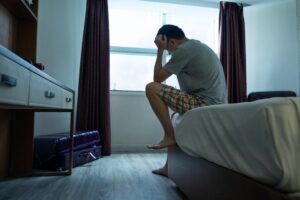In the intricate tapestry of human experience, the interplay between mental health and sexuality is profound and multifaceted. Sexual intimacy is a vital component of human relationships, contributing to emotional bonds, physical well-being, and overall satisfaction. Among the various factors that can impact one’s sexual well-being, anxiety emerges as a powerful force, capable of casting a shadow over the intimate aspects of our lives. This article explores the complex relationship between anxiety and sexual functioning, shedding light on how anxiety can interfere with one of the most intimate aspects of our lives.
Understanding Anxiety
Before delving into the ways anxiety can affect sexual experiences, it’s important to understand what anxiety is. From social interactions to daily routines, anxiety can exert a profound influence on our thoughts, emotions, and behaviors. Anxiety is a common emotional response characterized by feelings of unease, worry, and fear. While it is a normal and adaptive response to certain situations, chronic or excessive anxiety can have profound negative effects on various aspects of life, including sex and relationships.
Anxiety and the Sexual Response Cycle
The sexual response cycle provides an overview of how people respond to sexual stimuli. Basically: what turns us on, keeps us turned on until orgasm, and then what happens after orgasm. Masters and Johnson first created it and it consists of four phases: desire, arousal, orgasm, and resolution. Anxiety can interfere with each of these phases, creating sexual difficulties that manifest in different ways.
Desire is what your brain sees as sexually relevant. Such as “Does this feel good” or “is that sexy?” Desire occurs in your mind and needs to be maintained through the sexual response cycle to get to orgasm. Think of it as an accelerator. You need to keep pressing on the gas pedal to move. Anxiety can diminish sexual desire by taking your foot off the gas. Worry, stress, and preoccupation with anxious thoughts can lead to a reduced interest in sex because they become distractions. We need to focus to maintain desire. The car won’t go anywhere if we keep taking the foot off the accelerator. Our brain also has to slow down and focus enough to remember to press the accelerator. Suppose our mind is so busy that we don’t think about sex or prioritize it. This can result in decreased initiation of sexual activity and a lack of enthusiasm, leading to relationship strain.
Arousal is your body telling you that there are sexually relevant stimuli inside or outside yourself. While desire is in your mind, arousal is what happens in your body. It is increased blood flow to your genital, increased temperature, and sensitivity to various body parts. Many have a different experience with how their body tells them they experience arousal. It is also important to note that sometimes our mind and body and not on the same page and you might have to work at it to get them on the same page. Anxiety often leads to physical symptoms such as increased heart rate, muscle tension, and restlessness. These physiological responses can hinder the body’s ability to become sexually aroused, making it difficult to achieve and maintain an erection in men and lubrication and engorgement in women. Anxiety can often take over your mind and can make it difficult to pay attention to what is going on in your body. Tuning into your body is essential for the sex.
Orgasm is often the goal sought with sex and is the physical release of built-up sexual excitement. Anxiety can disrupt the ability to reach orgasm. For some, the fear of performance, body image issues, or concerns about their partner’s satisfaction can create anxiety during sexual activity, making it challenging to achieve climax. Without focusing and feeling relaxed, it is difficult to “get over the edge” to orgasm. Anxiety creates distractions making it difficult to focus. Further, if you are having negative or distracting thoughts, relaxation is unlikely.
Resolution: After orgasm, individuals often experience a sense of relaxation and well-being. However, anxiety can prevent this relaxation, leading to post-sexual anxiety or guilt. This can create a cycle where the anticipation of anxiety-related issues further exacerbates sexual problems. Having thoughts right after a sexual event about if you performed well, how you looked, if your partner was satisfied enough, or all the next things you need to do will make it difficult to enjoy the pleasure you hopefully just received from your body or connect with your partner.
Common Anxiety Disorders and Their Impact on Sex
Anxiety can be short and centered around something specific (such as sex) or longer lasting and impair overall functioning, not just sex. Once daily functioning is impacted by anxiety, then it may meet the criteria for a disorder. Several anxiety disorders can interfere with sexual functioning:
Generalized Anxiety Disorder (GAD): Individuals with GAD often experience excessive worry about various aspects of their lives. This persistent worry can spill over into their sexual experiences, leading to decreased desire and difficulty achieving arousal. A busy brain thinking about what is next has a hard time being in the present in the moment. Sexual satisfaction is more likely to happen when you can be present in your body so you can feel the pleasure it has to offer. Relaxation is needed for orgasm and when we are worrying about many things, it makes it hard to relax. People with GAD often struggle to slow down, relax, and sometimes be playful with their partners.
Social Anxiety Disorder: Social anxiety, or social phobia, can make sexual encounters with a partner highly stressful. Fear of judgment and negative evaluation can lead to avoidance of sexual situations, impacting one’s sex life and relationship. It may also cause some people to not pursue relationships or only allow themselves to engage in casual sex to reduce social connection. For those with social anxiety, they may be more likely to focus on masturbation as a means of sexual gratification. Masturbation is healthy and a great way to get to know your body and doesn’t require others. If it is the only focus it makes it easier to not pursue relationships. Not everyone must be in a relationship, but professional help may provide a way to navigate relationships for those who would like to eventually be in a relationship.
Anxiety of Specific Things or Events: Performance anxiety, often linked to specific situations like public speaking or sexual performance, can lead to erectile dysfunction in men and difficulty achieving orgasm in women. The pressure to perform can create a cycle of anxiety that exacerbates the problem. Sex therapists can help those with performance anxiety increase confidence and establish strategies to help overcome sex-related anxiety.
Obsessive Compulsive Disorder (OCD) consists of illogical thoughts that lead to compulsive behaviors. People can have obsessive thoughts about germs and compulsively wash their hands. Those with OCD can have similar challenges when it comes to sex and relationships. There can be irrational thoughts about pornography, sex workers, or people they meet on apps creating compulsive sex with others or masturbation. Some individuals can also have OCD-like thoughts or behaviors around cleanliness before allowing themselves to be sexual alone or with someone else. No matter how it may manifest, help is available.
Post-Traumatic Stress Disorder (PTSD): Traumatic experiences can lead to symptoms of anxiety and hyperarousal, which can be particularly disruptive during sexual activity. Re-experiencing trauma or feeling disconnected from one’s body can hinder sexual enjoyment. Sex therapists can help individuals feel safe in their bodies and reconnect with it if part of their coping mechanism is to turn off their mind/body connection. They can also help couples support one another to have sexual experiences that are comfortable for both people.
Coping Strategies and Treatment
Fortunately, there are strategies and treatments available to help individuals manage anxiety and improve their sexual experiences. Sex therapists are trained in specific techniques for sexual challenges. They can work collaboratively with general therapists who may be treating anxiety-related disorders.
Sensate Focus Therapy (SFT): SFT is a combination of exposure therapy, systematic desensitization, and mindfulness. It helps people learn how to be present in their body, find safety in their body, improve communication with their partner, increase confidence in sexual functioning, and manage distractions that create a busy brain.
Cognitive-Behavioral Therapy (CBT): CBT is an evidence-based approach that helps individuals identify and change negative thought patterns that may be distractions before, during, or after sexual experiences. It has been effective in treating various anxiety disorders, including those that impact sexual function.
Communication: Open and honest communication with a partner can alleviate some anxiety-related issues. Discussing fears, insecurities, and desires can lead to increased understanding and emotional support. It can also make it easier to feel emotionally safe and relaxed with one another. Ultimately, communication is needed for sexual satisfaction because partners can’ mind-read what feels good to them in the moment. You have to tell them.
Relaxation Techniques: Learning relaxation techniques such as deep breathing, mindfulness, meditation, or progressive muscle relaxation can help reduce anxiety symptoms, making it easier to engage in sexual activity without interference.
Medications: In some cases, medications such as selective serotonin reuptake inhibitors (SSRIs) or other anti-anxiety medications may be prescribed to alleviate anxiety symptoms, which would indirectly improve sexual functioning and satisfaction. It’s essential to consult a healthcare professional to discuss the potential benefits and side effects of medication.
Anxiety’s interference with sex is a significant issue that affects many individuals and relationships. It’s crucial to recognize that anxiety and sexual difficulties are treatable. Seeking professional help, whether through therapy or medication, can be a crucial step toward reclaiming a fulfilling and satisfying sex life. Additionally, open communication with a partner and the cultivation of relaxation strategies can contribute to a more positive and anxiety-free sexual experience. Remember that addressing anxiety-related sexual issues is a journey, and seeking support is a courageous and empowering first step. We can help at Sexual Health and Healing! Complete our contact form to get started.








